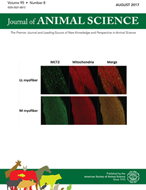-
Views
-
Cite
Cite
M. Katsumata, M. Matsumoto, S. Kawakami, Y. Kaji, Effect of heat exposure on uncoupling protein-3 mRNA abundance in porcine skeletal muscle, Journal of Animal Science, Volume 82, Issue 12, December 2004, Pages 3493–3499, https://doi.org/10.2527/2004.82123493x
Close - Share Icon Share
ABSTRACT
Exposure to cold increases abundance of mRNA for uncoupling protein-3 (UCP3) in skeletal muscle, whereas the influence of exposure to heat is unknown. Thus, we conducted a study to investigate the influence of heat exposure on UCP3 mRNA abundance in porcine skeletal muscle. Three pigs aged 110 to 120 d, with an average BW of 75 kg, from each of eight litters were used. Each littermate was assigned to one of three treatment groups; one group was reared at 32°C and fed ad libitum (32AL) for 4 wk, whereas the other two groups were maintained at 23°C for the same period, and either pair-fed the intake of their 32AL littermates (23PF), or fed ad libitum (23AL). The RNase protection assay revealed that UCP3 mRNA abundance in longissimus dorsi and rhomboideus muscles was higher (P < 0.05) in the 32AL group than the 23PF group. The 23AL group also had significantly higher UCP3 mRNA abundance than the 23PF group in these muscles. Plasma total 3,5,3′-triiodothyronine concentration of the 32AL group was lower (P < 0.05) than that of the 23PF group, whereas mRNA abundance of thyroid hormone receptor (TR) isoforms, TRα1 and TRα2, in these muscles was not affected, suggesting that the 32AL group was in a relatively hypo-thyroid state. Because thyroid hormone up-regulates UCP3 expression, these results indicate that factors other than thyroid hormone may play a role in regulating UCP3 mRNA abundance in skeletal muscle of heat-exposed pigs.





